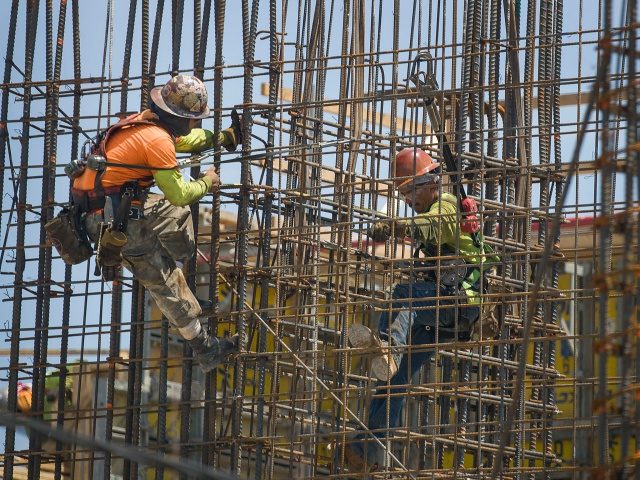The United Steelworkers union, along with other manufacturing groups, says former President Trump’s tariffs on imported steel “have been a success,” urging President Joe Biden to keep the tariffs in place.
In a letter to Biden, the United Steelworkers — along with the American Iron and Steel Institute, Steel Manufacturers Association, the Committee on Pipe and Tube Imports, Specialty Steel Industry of North America, the American Institute of Steel Construction, and the Alliance for American Manufacturing — said the 25 percent tariff on imported steel imposed by Trump in 2018 has been a boon for the United States steel industry and American workers.
The tariffs, the United Steelworkers wrote, ought to be kept in place as the Biden administration negotiates the issue with European Union officials.
“On behalf of American steel producers, fabricators and workers, we write today to emphasize the importance of the steel tariffs put in place by the U.S. government in 2018,” the letter continues:
The tariffs were necessitated by repeated surges in steel imports driven by global steel overcapacity that threatened our industry and the nearly two million jobs it supports. The tariffs have been a success, allowing our industry to restart idled mills, rehire laid-off workers and invest in the future. Since the tariffs took effect, American steel producers have announced plans to invest more than $15.7 billion in new or upgraded facilities —investments that are now beginning to bear fruit in the form of permanent, family-sustaining steel jobs and economic activity that supports communities across the United States. [Emphasis added]
Opponents of the steel tariffs argue that they should be eliminated to increase supply, given the current environment of rising prices and long lead times. This ignores the fact that the COVID-19 pandemic has posed unprecedented, but temporary, challenges to global supply chains in many industries—including lumber, semiconductors, concrete, agricultural products and cleaning products—as manufacturers respond to rapid and unpredictable shifts in customer demand and logistical difficulties. The same is true for steel. Indeed, virtually every steel market around the world is experiencing record high prices and long local lead times. [Emphasis added]
Domestic steel supply is responding to market signals. Steel production has increased by more than 50 percent in the last year. Steel mill employment has increased by nearly 3,000 since September. Meanwhile, the tariffs are providing a fairer and more level playing field, creating the market stability needed for companies to invest in the future of the domestic steel industry, including a significant amount of new steelmaking capacity that has come on line very recently. The new capabilities resulting from these investments in new and upgraded facilities will further expand the ability of steel producers to meet increases in demand from a comprehensive infrastructure investment program and growth in the renewable energy sector. [Emphasis added]
Eliminating the steel tariffs now would undermine the viability of our industry. Global steel overcapacity has only increased during the pandemic, and past economic crises have led to devastating import surges as other nations dumped their excess steel into the U.S. market. Given the essential role of the steel industry to the nation’s defense and its critical infrastructure, the tariffs must remain in place. Moreover, the American steel industry’s favorable environmental footprint—as the cleanest and most energy efficient of major steel industries—makes it indispensable in the pursuit of our nation’s critical climate goals. [Emphasis added]
Last month, Biden’s Department of Commerce Secretary Gina Raimondo admitted that Trump’s tariffs on imported steel and aluminum “helped save American jobs in steel and aluminum industries.”
“There is a place for tariffs,” Raimondo said.
Recent research by the Economic Policy Institute (EPI) shows the Trump tariffs on steel imports were hugely beneficial to the U.S. steel industry and American workers:
A survey of publicly available sources reveals that following implementation of Sec. 232 measures, U.S. steel producers announced new investments, upgrades, plant expansions, and reopenings of idled facilities in at least 15 states, including plans to invest more than $15.7 billion in new or upgraded steel facilities, creating at least 3,200 direct new jobs, many of which are now poised to come online. In addition, more than $5.9 billion was invested in plant acquisitions by nine firms, as part of industry restructuring to increase efficiency, preserving additional jobs at those facilities. [Emphasis added]
Despite these massive gains, close to 108,000 product exclusion requests, granted by the federal government, have since hurt those gains, the EPI researchers found.
“These exclusions and exemptions significantly curtailed the coverage of Section 232 measures, although the measures remain significant in reversing the trend of declining viability of the U.S. steel industry,” the EPI researchers state. “Today, a majority of steel products are imported to the United States either on a duty-free basis or under Sec. 232 product exclusions.”
Since the North American Free Trade Agreement (NAFTA) was enacted and China entered the World Trade Organization (WTO), nearly five million American manufacturing jobs have been eliminated from the American economy. The mass elimination of working- and middle-class jobs and depressed U.S. wages due to NAFTA has coincided with a nearly 600 percent increase in trade deficits.
Between 1979 and 2017, the wages of the bottom 90 percent — the country’s working and lower middle class — have grown by only about 22 percent, EPI researchers have found.
Compare that small wage increase over nearly four decades to the booming wage growth of America’s top one percent, who have seen their wages grow more than 155 percent during the same period.
One former steel town in West Virginia lost 94 percent of its steel jobs because of NAFTA, with nearly 10,000 workers in the town being displaced from the steel industry.
American manufacturing is vital to the U.S. economy as every one manufacturing job supports an additional 7.4 American jobs in other industries.
John Binder is a reporter for Breitbart News. Email him at jbinder@breitbart.com. Follow him on Twitter here.

COMMENTS
Please let us know if you're having issues with commenting.